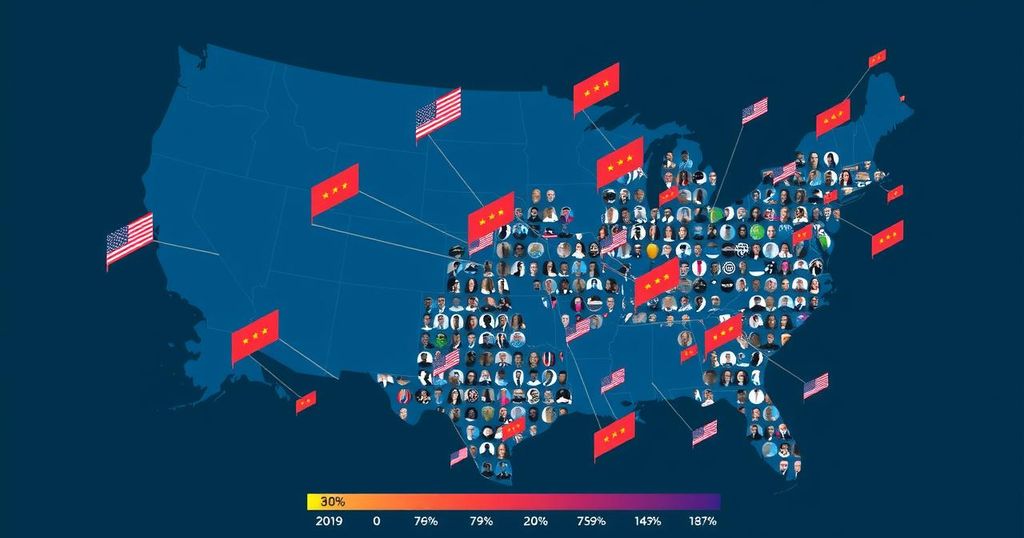The Global Implications of the Upcoming U.S. Presidential Election
The U.S. presidential election holds profound global implications, influencing international relations, trade, and climate policies. The choice between Vice President Harris and former President Trump will impact conflicts in Israel and Ukraine, U.S.-China relations, European alliances, global trade systems, and climate action efforts. The ramifications of this election will resonate across borders, as the world awaits the outcome.
The implications of the upcoming U.S. presidential election extend far beyond American borders, impacting global dynamics in areas such as international conflicts, trade relations, climate change, and geopolitical alliances. The decision of American voters—whether to elect Vice President Kamala Harris or former President Donald J. Trump—will dictate America’s role as a superpower and shape its future interactions with allies and adversaries alike. In Israel, polling suggests a strong preference for Trump among its citizens, who believe a Trump administration would not challenge their policies regarding Palestinian statehood. However, the essence of U.S. influence may remain limited regardless of the outcome, as internal Israeli opinions on the two-state solution have hardened. While Harris may advocate for a cease-fire and negotiations, Trump is likely to maintain a more deferential posture towards Israeli governmental decisions. In the context of Russia and Ukraine, the stakes are particularly high. Ukrainians fear that a Trump presidency may lead to a resolution that favors Russian interests, while there is hope that Harris would sustain military support for Ukraine. This election may bolster Putin’s ambitions in Ukraine irrespective of the U.S. president, as he perceives an opportunity to negotiate a victory with either candidate. Relations with China are another focal point. Both candidates are expected to adopt a hawkish stance towards China, yet opinions in Beijing are mixed. Trump’s advocacy for heavy tariffs could pose significant risks to China’s economy, whereas a Harris administration may continue the current strategy of strengthening alliances in the Asia-Pacific region. European sentiment regarding the election is characterized by uncertainty. A Trump victory could reignite nationalist sentiments across Europe, while potentially threatening NATO solidarity with his past critiques of the alliance. Conversely, a Harris presidency may not alleviate European concerns, as she may still expect allies to increase their defense spending. The election will also determine the future of global trade. Trump’s inclination towards aggressive tariffs could result in the dismantling of longstanding international trade frameworks, posing systemic risks to global economic stability. Meanwhile, Harris is likely to maintain a more measured approach to tariffs while still addressing security concerns posed by China. In Africa, perceptions of the candidates differ; Trump’s past disparagement of African nations is juxtaposed against his image as a decisive leader. Harris’s African heritage and her past engagements may lead to more favorable views among African leaders. The impact on global climate initiatives is also significant, as a Trump presidency could reverse many of the progress made under the current administration, jeopardizing international climate efforts. In neighboring Mexico, looming challenges arise from an impending Trump administration, which would exacerbate border tensions and potential tariffs. Regardless of the election outcome, immigration policies are likely to remain stringent, presenting ongoing hurdles for Mexico. Ultimately, the U.S. election not only signifies a pivotal choice for American voters but heralds a momentous shift in global relations across multiple dimensions. The world will closely observe the election’s outcome, as it will determine America’s future international engagements and global leadership stance.
The U.S. election serves as a pivotal moment that will greatly affect international relations and policies worldwide. The decisions made by American voters, regarding the leadership of either Vice President Kamala Harris or former President Donald J. Trump, will have noteworthy implications across various global fronts, including conflicts in the Middle East, tensions in Eastern Europe, trade dynamics with China, and climate change initiatives. As both candidates have varying approaches to these issues, the international community remains vigilant about the repercussions of the election results.
In conclusion, the upcoming U.S. presidential election presents a watershed moment not only for American domestic policy but also for global stability and future relations. The election outcome will define U.S. foreign policy directions, influence trade practices, and shape international alliances, particularly regarding key countries such as Israel, Russia, China, and Mexico. Regardless of the winner, the world will feel the repercussions of the United States’ chosen path.
Original Source: www.nytimes.com




Post Comment